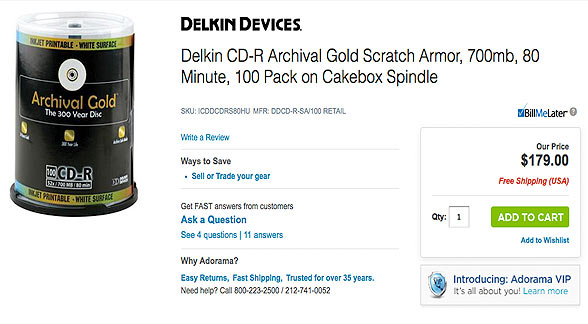A $40 CD-R?
I’m sorry I can’t resist. In my daily search around the web for interesting or scary audio related articles or posts, I came across an audiophile music site selling music recorded on CD-Rs for $40 a pop! But lest you think these are standard issue CD-Rs, let me assure they are not. These are Master Quality Discs [MQD] and they’re made out of 24K gold as opposed to aluminum.
The gold that’s used on the discs is claimed to prevent “CD rot”, which is a real phenomenon that causes normal CD-Rs to begin fail after a few years. Normal CD-Rs are supposed to last about 75 years AND will if you’re careful how you handle them. You know don’t leave them on the dashboard of your car. Don’t touch them with your greasy fingers or any other toxic substances. And don’t run green magic marker around the edges! Holy cow…does anybody really fall for this stuff?
I did a quick Google search for 24K gold CD-Rs and found them. They cost about $1.80 each in a bulk pack of 100. You’ll have to secure some blank CD cases to put them in but that only brings the cost to around $2 per unit. Where does the value for the other $38 come in? I charge $35 for a Blu-ray disc that contains real HD-Audio, three mixes, HD-Video of the entire session, headphones mixes, pre-ripped FLAC files at 96/24, 320 kbps MP3 files for your portable player, bonus materials AND a printed booklet in a nice blue plastic case. Maybe I’m not charging enough if people are really spending $40 (plus S&H) for a 50-minute standard resolution stereo CD.
You may recall my previous discussion about the CD format. It’s locked in per the Redbook specification. The best audio specs that you can burn or stamp into a CD is 44.1 kHz/16-bit PCM audio. No more. As has also been pointed out here and elsewhere, CD-Audio discs can sound incredible! They have the potential to be better and more accurate than vinyl and analog tape.
You might want to check out the NPR show “Science Friday” from a year or so ago. Dr. Sean Olive, the Director of Acoustic Research at Harman International and the Director of Recording Arts and Science at the Peabody Institute Scott Metcalfe discuss the relative merits of CD and vinyl with host John Dankosky. The title of the episode is “Why Vinyl Sounds Better Than CD, Or Not”.
As you might expect both of these professionals prefer CDs to vinyl LP. Take a listen, here’s the link:
Why Vinyl Sounds Better Than CD, Or Not
So CDs can be great but is a burned CD-R better than a replicated disc? And is burning to a 24K CD-R better than burning to a standard CD-R? And I guess I should complete the thought and ask…is using a laser beam recorder to etch a glass CD with the same 44.1 kHz/16-bit data better still (and worth the $800 each that a Japanese audiophile site was charging for these discs!)?
The fact is that all three discs will sound absolutely identical. The laser pickup will read the pits (or the areas of reflectivity on the recordable discs) and send the same stream of ones and zeros to the DAC. There is no sonic improvement that can be attributed to the material that the disc is made of. The 24K discs will last longer. According to the vendor that I found, they should last 300 years.
The discs may survive 300 years but I can guarantee you that there will be no CD drives around to play them (how many people can still access a floppy disc these days?). As for the glass CD, it should last forever…as long as you don’t drop it.
More snake oil. You’ve been warned.

